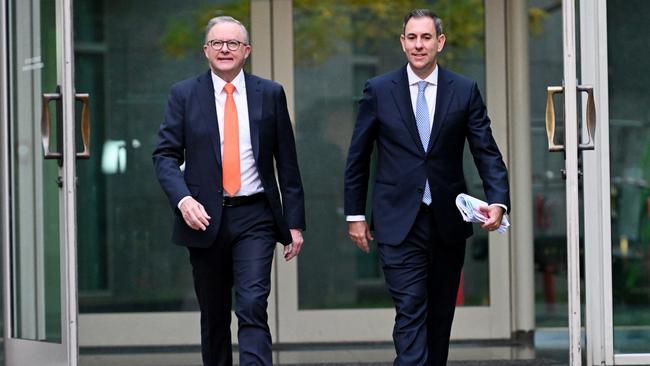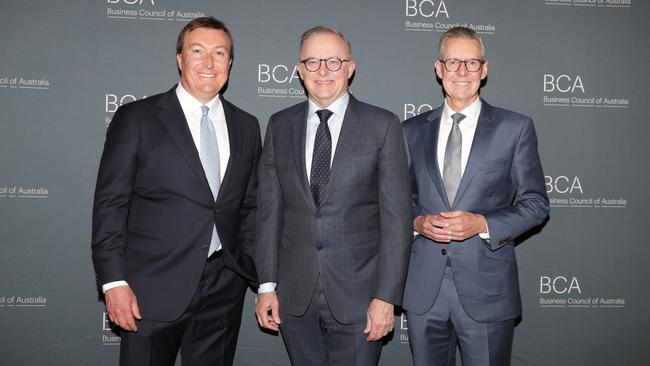
Like much of our national dialogue in this social media age, business has been concerned not to offend anyone and instead has sought to pay homage to the national liturgy of fairness. Never mind that we already have one of the world’s most progressive taxation systems.
The Australian Financial Review ran a piece on page one last Monday with a full length editorial inside questioning the effectiveness of the Business Council of Australia – once a powerful advocate for economic reform.
The masthead asked whether the BCA was too compliant in dealing with government under new chair Geoff Culbert and new chief executive Bran Black.
The following day, the paper led with Jennifer Hewett’s interview with former ACTU secretary Bill Kelty, a confidant of former treasurer and Labor prime minister Paul Keating. Kelty helped Keating and former prime minister Bob Hawke modernise the economy in the 1980s, but is a critic of the reform lethargy of the Albanese government.
On Tuesday, The Australian led with a speech to be delivered that night by Bran Black criticising the government’s lack of an economic reform agenda. Anthony Albanese told the annual BCA dinner that he wanted to work with business. He has no clue what a hash he has made in winding back Labor’s own reform history.

It is not just the Prime Minister and Treasurer Jim Chalmers. The Coalition was hardly any better in its nine years in office up until 2022, although it did not see big spending as the answer to every problem – until the arrival of Covid when it became the biggest spender in our history.
This column has often criticised the nation’s journalists for being too concerned with the way governments fund social projects, but less worried about growing the economic pie to ensure there are enough jobs and taxes to pay for such programs.
Much of the media cannot see past ‘gotcha’ questions about potential spending cuts by the Coalition, or desperately seek out the possible losers of any proposed economic reform. Look at David Speers’ interview on Insiders on September 15 with Coalition finance spokeswoman Jane Hume.
Speers hectored Hume for much of the interview to try to pin her down on exactly what a Coalition government would cut. This was just 11 days after it was revealed the nation’s per capita GDP had fallen for the sixth consecutive quarter.
This column believes business has been too quiet for a decade. A careful read of the BCA’s last big reform agenda document, Seize the Moment, released in August 2023, should make all BCA members ask whether its former director, Jennifer Westacott, was on a unity ticket with Chalmers about some of the ALP’s silliest ideas.
The BCA’s plan shares Chalmers’ naive enthusiasm for putting taxpayers’ money into private sector investment decisions. Think critical minerals processing, battery manufacture, so-called green manufacturing and the drive for net-zero emissions.
These all feature high on the list of the Albanese government’s priorities from its Future Made in Australia policy, released in April. This involves more government spending at a time when the Reserve Bank and Treasury are at odds about whether public demand driven by big- spending state and federal budgets is the main domestic driver of inflation.
Labor wants a central role for government in the economy. The old Hawke-Keating ALP economic agenda that Chalmers claimed to be emulating was more concerned with setting policies to free up business decision-making, creating a more efficient Australian labour market and improving competition in government service areas such as water and electricity.
Hawke and Keating saw opening up the economy to competition and investment as key to what they believed – correctly as history shows – would be the coming Asian century.
The BCA’s Seize the Moment at least argued that private capital should drive the economy. It warned, as this column has for two years, that business investment here was slowing because of uncompetitive industrial relations reforms pushed by former Workplace Minister Tony Burke and federal green tape on mining and development approvals.
The BCA said more local companies were investing offshore rather than here. It also described the challenges Australia would face as a price taker for its traditional economic strengths in exports of coal, iron ore, gold, beef, wool, wheat and services.
But like Chalmers and Albanese, the BCA saw net-zero emissions as a trigger for new opportunity – it saw social cohesion and female participation as critical to future prosperity.
The BCA was on stronger ground on the need for comprehensive tax reform and more flexible labour markets. Its report pushed for meaningful efforts to boost productivity and improve education standards.
Chalmers and Albanese, like much of the Western world, have seen US President Joe Biden’s Inflation Reduction Act as a sign that Western governments should be front and centre in national economic reconstruction after the pandemic.
In part, this reflects a crisis of confidence by social democrat governments in the critical role of markets in apportioning resources more efficiently than the central planners of Beijing.
It also echoes the strategic trade theory nonsense thrown up at Hawke and Keating about Japan 35 years ago. Trade spruikers used to think Japan’s Ministry for International Trade and Industry had created a new economic paradigm of co-operation between government and business.
Reality hit in 1989 and Japan lost three decades, its sharemarket shedding two-thirds of its value and its bloated property sector collapsing.
As in China today, the Japanese miracle was built on overheated property valuations. Just like Japan then, China’s inflated property sector is collapsing. Central planning is failing but Chalmers wants more of it.
The nation’s editors and news directors need to hire more economists and fewer graduates from communication and media courses.
Albanese and Chalmers are not economic seers. Chalmers is wrong about driving national productivity through the care economy and at least partly wrong about net zero. Both are likely to be drags on growth and productivity.
Labor is digging a deeper hole for the country than Chalmers’ old bosses, former treasurer Wayne Swan and former prime minister Julia Gillard, did with the National Disability Insurance Scheme and Gonski school funding.
Federal governments should not be building houses or doing the service delivery work that our Constitution reserves for state governments. Government should not be topping up the wages of private sector workers in aged care or child care.
Governments need to set the right conditions for business. Chalmers and Albanese need to start by addressing national productivity, which today sits at levels last seen in 2016.
At least business, conned by Labor when conscripted to the October 2022 National Jobs and Skills Summit, can now see what should have been obvious all along – even to journalists – about the ALP’s big government approach.






With so many journalists and politicians struggling to see a better path forward for Australia, big business has, in turn, been slow to espouse productivity and labour market reform in an era of rampant social policy spending.